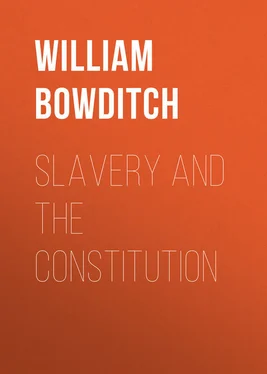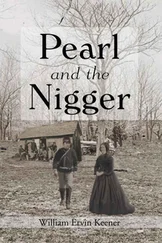William Bowditch - Slavery and the Constitution
Здесь есть возможность читать онлайн «William Bowditch - Slavery and the Constitution» — ознакомительный отрывок электронной книги совершенно бесплатно, а после прочтения отрывка купить полную версию. В некоторых случаях можно слушать аудио, скачать через торрент в формате fb2 и присутствует краткое содержание. ISBN: , Жанр: foreign_antique, foreign_prose, на английском языке. Описание произведения, (предисловие) а так же отзывы посетителей доступны на портале библиотеки ЛибКат.
- Название:Slavery and the Constitution
- Автор:
- Жанр:
- Год:неизвестен
- ISBN:http://www.gutenberg.org/ebooks/38716
- Рейтинг книги:4 / 5. Голосов: 1
-
Избранное:Добавить в избранное
- Отзывы:
-
Ваша оценка:
- 80
- 1
- 2
- 3
- 4
- 5
Slavery and the Constitution: краткое содержание, описание и аннотация
Предлагаем к чтению аннотацию, описание, краткое содержание или предисловие (зависит от того, что написал сам автор книги «Slavery and the Constitution»). Если вы не нашли необходимую информацию о книге — напишите в комментариях, мы постараемся отыскать её.
Slavery and the Constitution — читать онлайн ознакомительный отрывок
Ниже представлен текст книги, разбитый по страницам. Система сохранения места последней прочитанной страницы, позволяет с удобством читать онлайн бесплатно книгу «Slavery and the Constitution», без необходимости каждый раз заново искать на чём Вы остановились. Поставьте закладку, и сможете в любой момент перейти на страницу, на которой закончили чтение.
Интервал:
Закладка:
Slavery and the Constitution
NOTE
Page 45 was struck off before I became aware that "Master Auld" now shelters Douglass's grandmother under his own roof. We are glad of the fact, and respect Master Auld for his change. But the case of Douglass's grandmother is by no means a solitary instance of cruel treatment. I might easily adduce others equally cruel, though not told with nearly so much feeling.
W. I. B.CHAPTER I.
"SLAVERY AGREEABLE TO GOD'S PROVIDENCE"!
"Thus did Jehovah stereotype his approbation of domestic slavery"! — Rev. President Shannon, of Bacon College, Ky.
"Here we see God dealing in slaves ; giving them to his own favorite child [Abraham], a man of superlative worth, and as a reward for his eminent goodness." — Rev. Theodore Clapp, of New Orleans.
Nearly three millions of men, women, and children are held in slavery in the Southern States, not by the ignorant and brutal alone, but by enlightened Christian bishops, ministers, and church members of all denominations; whilst men and women of cultivated minds, refined manners, and delicate tastes, indignantly deny that slaveholding is wrong.
The Right Rev. George W. Freeman, Bishop of the Protestant Episcopal Church in Arkansas and Texas, whilst a minister at Raleigh, N.C. Nov. 27, 1836, preached two discourses on the character of slavery and the duties of masters. In these ("A Reproof of the American Church, by the Bishop of Oxford; with an Introduction, by an American Churchman;" New York, 1846, p. 6) he declared "that no man, nor set of men in our day, unless they can produce a new revelation from Heaven, are entitled to pronounce slavery wrong;" and that " slavery, as it exists at the present day, is agreeable to the order of Divine Providence ." The Right Rev. Levi S. Ives, Bishop of the diocese, was present; and, though a northern man, has in writing published that he listened to them "with most unfeigned pleasure"! (Ib. p. 7.) They were afterwards published with the bishop's note of approbation, under the title, "The Rights and Duties of Slaveholders." They were also printed in South Carolina, and distributed gratuitously as a tract by the Society for the Advancement of Christianity, – a society composed of clergymen and laymen, with Bishop Bowen at their head. (Ib. pp. 7, 8.) Rev. Theodore Clapp, [A] Конец ознакомительного фрагмента. Текст предоставлен ООО «ЛитРес». Прочитайте эту книгу целиком, купив полную легальную версию на ЛитРес. Безопасно оплатить книгу можно банковской картой Visa, MasterCard, Maestro, со счета мобильного телефона, с платежного терминала, в салоне МТС или Связной, через PayPal, WebMoney, Яндекс.Деньги, QIWI Кошелек, бонусными картами или другим удобным Вам способом.
the Unitarian minister of New Orleans, says ("Slavery, a Sermon delivered in the First Congregational Church in New Orleans, April 15, 1838," p. 11), "The same God who gave Abraham sunshine, air, rain, earth, flocks, herds, silver, and gold, blessed him with a donative of slaves ." Ib. p. 33: "To succeed, then, in putting down every thing like servitude, you must annihilate the word of God." Bishop Hedding, of the Methodist Episcopal Church, says ("The Church as it is," p. 50), "The right to hold a slave is founded on this rule, 'Therefore, all things whatsoever ye would that men should do to you, do ye even so unto them.'" The funds of churches and theological institutions are not unfrequently invested in slaves. Sometimes these slaves are hired out at auction, and from their earnings the salaries of the clergymen and professors are paid! At other times, they are sold in order to change the investment! Thus, in the "Charleston Courier," Feb. 12, 1835, there is advertised for sale, by Thomas N. Gadsden, "a prime gang of ten negroes, accustomed to the culture of cotton and provisions belonging to the Independent Church in Christ Church parish"! ("The Church as it is," p. 72.) No incredible story, therefore, was told by the fugitive slave, who gave as his reason for not receiving the Lord's Supper, "I could not bear to go forward, and receive the communion from vessels which were the purchase of my brother's blood." In the memorial of the Presbytery of Georgia to the Presbyteries of the Southern States in 1844, on the religious instruction of the negroes, it is stated that slaves are "connected with our churches; nay, more, they are owned by our church members and by our ministers." – "What is it," asks the Rev. Dr. Albert Barnes (Sermon in Philadelphia in 1846, "The Church as it is," p. 81), "that lends the most efficient sanction to slavery in the United States? What is it that does most to keep the public conscience at ease on the subject? What is it that renders abortive all measures to remove the evil?.. It is the fact that the system is countenanced by good men; that bishops and priests and deacons, that ministers and elders, that Sunday-school teachers and exhorters, that pious matrons and heiresses, are the holders of slaves; and that the ecclesiastical bodies of the land address no language of rebuke or entreaty to their consciences." More evidence to the same point might be adduced, if thought necessary.
This open vindication of the rightfulness of slaveholding is by no means confined to persons residing at the South. In the year 1847, the Rev. Geo. W. Blagden, of Boston, who delivered the last Dudleian Lecture in Harvard University, defended slavery from the Bible, in the pulpit of Old South Church, that second cradle of Liberty! Only last winter (1848), a gentleman of this State, of high legal attainments, at present connected with the Law School in Harvard University, in conversation hesitated not to declare to us his opinion, "that it was not desirable that slavery should cease"! And Dr. Taylor, of Yale College, at the head of the theological department, instructs his pupils, candidates for the ministry, that, "if Jesus Christ were now on earth, he would, under certain circumstances, become a slaveholder"! ("The Church as it is," p. 95.)
Open defenders of slavery are therefore found among the foremost of the leaders in Church and State. And how few of the opponents of the system have a deep, ineradicable conviction, that slaveholding is wrong under all circumstances! Our object is to create and deepen this conviction.
To prove our position, we shall not rely upon the physical condition of the slaves. Notwithstanding the fact is otherwise, we are willing to suppose that every slave is comfortably housed, and has sufficient food and clothing. These may give
"Ease to the body some, none to the mind
From restless thoughts."
Even if in a comfortable house, the slave is homeless! No joys cluster around his hearthstone! He has no wife to share his sorrows, or to partake his joys; for neither law nor public opinion sanctions the marriage of slaves! The very children whom the slave presses to his heart are not regarded, either by law or public sentiment, as his dear children, but only as part of the stock of the plantation! Mother and children may be, and are, sold at auction, and separated from him and from each other for ever! And yet the heart of the slave-mother yearns for her children as much as the heart of the white mother.
By giving me a spiritual nature capable of improvement, God has made it my duty to strive to improve myself, – has declared that I have a natural right to improve myself, and that any wanton or unnecessary infringement of this right is a wrong. No man has the right to prevent me, or the meanest slave, from earnestly seeking after wisdom; to prevent me, or the meanest slave, from becoming pure in heart; or to deaden my affections, or those of the humblest slave that walks. In keeping a slave ignorant or impure, or in blunting his affections, even though he is well fed, clothed, and housed, violence is offered to his nature; his God-given rights are infringed; a wrong is done!
Читать дальшеИнтервал:
Закладка:
Похожие книги на «Slavery and the Constitution»
Представляем Вашему вниманию похожие книги на «Slavery and the Constitution» списком для выбора. Мы отобрали схожую по названию и смыслу литературу в надежде предоставить читателям больше вариантов отыскать новые, интересные, ещё непрочитанные произведения.
Обсуждение, отзывы о книге «Slavery and the Constitution» и просто собственные мнения читателей. Оставьте ваши комментарии, напишите, что Вы думаете о произведении, его смысле или главных героях. Укажите что конкретно понравилось, а что нет, и почему Вы так считаете.












